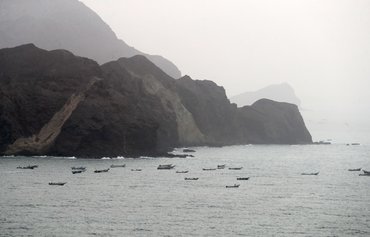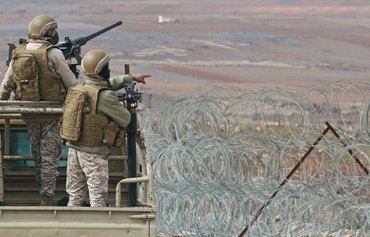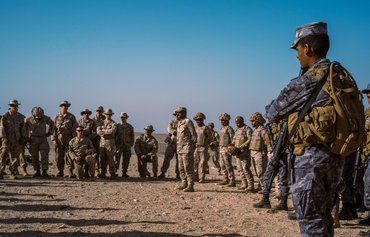AMMAN -- With Iranian aggression contributing to rising tensions in the Arabian Gulf, a key hub for global trade, the importance of the Gulf of Aqaba, a bustling trade hub at the north end of the Red Sea, has come into sharper focus.
The Gulf of Aqaba is an integral part of a network of secured waterways that stretch from the Mediterranean Sea to the Indian Ocean, with easy access to routes that connect the Red Sea to the Arabian Sea and the Mediterranean.
The Red Sea has been central to maritime trade for centuries, its significance only increasing after the Suez Canal opened in 1869.
Today it serves as a major crossing point for the export of Gulf oil to world markets, according to strategic and military expert Hisham Khreisat.
![Special operation forces from Kuwait, Jordan, France and the United States participate in the 'Eager Lion' joint military exercise in the Gulf of Aqaba on June 5, 2014. [Khalil Mazraawi/AFP]](/cnmi_di/images/2021/06/14/30322-Eager-Lion-Aqaba-600_384.jpg)
Special operation forces from Kuwait, Jordan, France and the United States participate in the 'Eager Lion' joint military exercise in the Gulf of Aqaba on June 5, 2014. [Khalil Mazraawi/AFP]
![A general view shows the Red Sea Jordanian resort city of Aqaba at sunset on September 24, 2018. [Thomas Coex/AFP]](/cnmi_di/images/2021/06/14/30323-Aqaba-Red-Sea-600_384.jpg)
A general view shows the Red Sea Jordanian resort city of Aqaba at sunset on September 24, 2018. [Thomas Coex/AFP]
The significance of the Red Sea corridor has been most prominent at times of war and crisis, when various types of military equipment have passed through it.
This was the case during the Gulf War of 1990-1991 and during the mobilisation of forces for the invasion of Iraq in 2003, he said.
Efforts to secure the Red Sea
Arab countries bordering the Red Sea are fully invested in preserving the security of the strategic waterway.
The idea for a "Red Sea Forum" has been regularly discussed in recent years, as a means for littoral states and concerned parties to discuss shared interests, identify emergent threats and forge common solutions.
A Brookings Doha Centre analysis paper published in November 2019 (Toward a Red Sea Forum: The Gulf, the Horn of Africa, & Architecture for a New Region) notes that the idea of Red Sea co-operation has been around for a long time.
"Every coastal nation in the region lays claim to the intellectual genesis of Red Sea co-operation," the report says.
Of the various Red Sea initiatives that have been undertaken by governments and international institutions in recent years, those put forward by Saudi Arabia and Egypt have gained the most traction.
In September 2020, a new regional council involving eight countries in the Red Sea corridor was launched, with Saudi Arabia at the helm, French media outlet RFI reported.
Saudi Arabia, Egypt, Yemen and Jordan signed the charter of the Council of Arab and African Coastal States of the Red Sea and Gulf of Aden, along with Sudan, Djibouti, Somalia and Eritrea.
The council aims to tackle piracy, smuggling and other related issues and enhance stability in the region.
Israel, the other country that borders the Gulf of Aqaba, signed peace treaties with Jordan in 1994 and with Egypt in 1979.
Aqaba port: a maritime gateway
The Jordanian port of Aqaba has seen rapid expansion in recent years due to its strategic location at the meeting point of two continents at the crossroads that link the Levant to the Horn of Africa, Indian Ocean and the Gulf region.
As Jordan's only outlet to the sea, the port of Aqaba is the second-busiest container port along the Red Sea, by container volume, and is within visible distance to the Israeli port of Eilat.
Its 12 terminals are busy around the clock, handling over half of Jordan’s exports and imports, and cargo bound for or coming from other countries in the region.
The city's economy is largely based around the port, which contains the Aqaba container terminal (ACT) and is Jordan’s only container port. Regionally, the port is the fourth biggest, with an annual traffic of approximately 1.3 million TEU.
The port has served as a maritime hub since as early as 1500 BCE, with a history as a regional centre for trade that dates back to 4000 BCE.
It has been the favoured port of call for cargo vessels coming from major Asian ports bound for Jordan and elsewhere in the Levant.
Development projects have been popping everywhere in Aqaba, especially since Jordan's King Abdullah launched the Aqaba Special Economic Zone in 2001, with the aim of developing the strategic zone of Aqaba.
The port of Aqaba is preparing for a qualitative leap that will make it one of the key international ports.
In October 2017, Saudi Arabia announced the launch of an independent economic zone on the Red Sea, dubbed "NEOM", with a half a trillion dollars in projected investments, during its annual Future Investment Initiative forum.
The zone covers an uninterrupted coastline of nearly 470km in north-western Saudi Arabia and will extend into territories in Jordan and Egypt.
The NEOM deal underscores growing strategic ties between the Arab world's richest and the most populous states -- Saudi Arabia and Egypt -- which are both opposed to Iran's influence in the region.
It is expected to improve economic conditions in the region and fuel positive development, underscoring the area's historic and emerging role as a secured, thriving hub amid the region's instability.

![The Gulf of Aqaba seen stretching up to the right from the Red Sea and the Gulf of Suez on the left, with the Sinai Peninsula between them. [NASA]](/cnmi_di/images/2021/06/14/30321-9360760816_cbfdcd4d6c_o-600_384.jpg)






